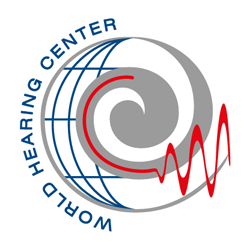Current Issue
Volumes and Issues
For Authors
Manuscript Guidelines
Review Process
Conflict of Interest
Copyright
About the Journal
Editorial Board
Aim and Scope
Policy and Ethical Guidelines
Promotion of the Journal
Print-Version Subscription
Publisher and Contact Information
Contact Information
Sign in as an AUTHOR/REVIEWER
AUDIOLOGICAL ISSUES IN A CASE OF CHARGE
SYNDROME
1
Department of Audiology, IFACF ORL “Prof. Dr. D. Hociota”, Bucharest, Romania
Publication date: 2011-06-30
J Hear Sci 2011;1(2):83-85
KEYWORDS
TOPICS
ABSTRACT
Background:
CHARGE syndrome is a genetic disorder resulting in the association of multiple congenital anomalies. The diagnosis of CHARGE syndrome is based on a combination of major and minor characteristics. Approximately half of individuals with CHARGE have severe to profound hearing loss.
Materials and Methods:
The authors present a case of a 4 year old child diagnosed with CHARGE syndrome that was referred to our department due to complete absence of expressive language and reaction to sounds. The protocol included: acoustic immittance, observation audiometry and click ABR on air and bone conduction under natural sleep and short duration general anesthesia.
Results:
The investigations revealed mixed profound hearing loss with middle ear effusion on the left side and severe sensorineural hearing loss on the right ear. The first option of treatment was classic bilateral hearing aid, after grommet insertion in the left tympanic membrane and effusion drainage.
Conclusions:
Any infant suspected of having CHARGE syndrome should undergo complete audiological examination since the frequency of sensory-neural hearing loss or vestibular problems are as high as 75-80%. Evaluation of hearing sensitivity during infancy and provision of amplification are important components in the process of auditory habilitation. Negligence in monitoring for auditory disabilities may result in increased developmental delay.
CHARGE syndrome is a genetic disorder resulting in the association of multiple congenital anomalies. The diagnosis of CHARGE syndrome is based on a combination of major and minor characteristics. Approximately half of individuals with CHARGE have severe to profound hearing loss.
Materials and Methods:
The authors present a case of a 4 year old child diagnosed with CHARGE syndrome that was referred to our department due to complete absence of expressive language and reaction to sounds. The protocol included: acoustic immittance, observation audiometry and click ABR on air and bone conduction under natural sleep and short duration general anesthesia.
Results:
The investigations revealed mixed profound hearing loss with middle ear effusion on the left side and severe sensorineural hearing loss on the right ear. The first option of treatment was classic bilateral hearing aid, after grommet insertion in the left tympanic membrane and effusion drainage.
Conclusions:
Any infant suspected of having CHARGE syndrome should undergo complete audiological examination since the frequency of sensory-neural hearing loss or vestibular problems are as high as 75-80%. Evaluation of hearing sensitivity during infancy and provision of amplification are important components in the process of auditory habilitation. Negligence in monitoring for auditory disabilities may result in increased developmental delay.
REFERENCES (6)
1.
Davenport SLH, Hefner MA, Mitchell JA: The spectrum of clinical features in CHARGE syndrome. Clin Genet, 1986; 29: 298–310.
2.
Blake KD, Issekutz KA, Smith IM et al: The incidence and prevalence of CHARGE syndrom. [http://www.CPS.ca] The CPSP annual report 2002 and 2003.
3.
Vissers LE, van Ravenswaaij CM, Admiraal R et al: Mutations in a new member of the chromodomain gene family cause CHARGE syndrome. Nat Genet, 2004, 36: 955–57.
4.
Amiel J, Attiee-Bitach T, Marionowski R et al: Temporal bone anomaly proposed as a major criterion for diagnosis of CHARGE syndrome. Am J Med Genet, 2001; 99(2): 124–27.
5.
Smith IM, Nichols SL, Issekutz K, Blake K: Canadian Paediatric Surveillance Program: Behavioral profiles and symptoms of autism in CHARGE syndrome: preliminary Canadian epidemiological data. Am J Med Genet A, 2005, 133: 248–56.
6.
Thelin JW, Fussner JC: Factors related to the development of communications in CHARGE syndrome. Am J Med Genet A, 2005; 133: 282–90.
Share
RELATED ARTICLE
We process personal data collected when visiting the website. The function of obtaining information about users and their behavior is carried out by voluntarily entered information in forms and saving cookies in end devices. Data, including cookies, are used to provide services, improve the user experience and to analyze the traffic in accordance with the Privacy policy. Data are also collected and processed by Google Analytics tool (more).
You can change cookies settings in your browser. Restricted use of cookies in the browser configuration may affect some functionalities of the website.
You can change cookies settings in your browser. Restricted use of cookies in the browser configuration may affect some functionalities of the website.



